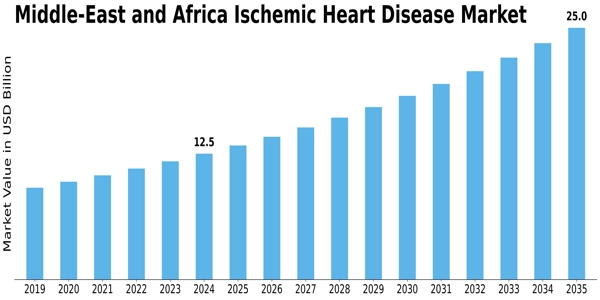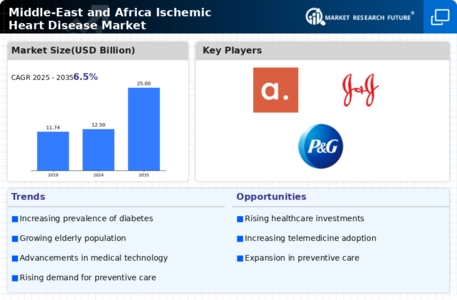Mea Ischemic Heart Disease Size
MEA Ischemic Heart Disease Market Growth Projections and Opportunities
The Middle East and Africa have a lot of people with ischaemic heart disease, which is very bad for business there. For ischemic heart disease to happen, the heart muscle needs more blood than it gets. A lot of people get this condition, which means that more tests, treatments, and ways to keep it from happening are needed. IHD is more common in the Middle East and Africa because their people are getting older and their lives are changing. It gets worse as the population grows and more people have risk factors linked to their lifestyle, like not exercising enough and eating poorly. The market will now work differently. It is becoming more common for people in some parts of Africa and the Middle East to move to towns and adopt western ways of life. People who live in cities tend to change the way they eat, smoke more, and move less. All of these things raise the chance of cardiovascular disease and, by extension, IHD. The IHD market is touched by attempts to teach more people about heart health and make more people aware of it. Care for people with ischemic heart disease has changed because of public health campaigns, educational efforts, and community service programs that help people get diagnosed early, make changes to their lifestyle, and stick with their medical treatments. Better imaging methods and biomarker analysis are two new technologies that are very important to the IHD market. A lot of people in the area want modern testing tools because they help doctors make more accurate diagnoses and find ischemic heart disease early, which is good for patients. How easy it is to get to healthcare services like heart care centers and trained healthcare workers is a big market factor. Access to health care may not be the same everywhere in the Middle East and Africa. This can change how often ischaemic heart disease is found and treated, which in turn can change market trends. Things that the government does to improve heart health have an effect on the IHD market. There are more people with ischemic heart disease and it is harder to treat because of investments in cardiovascular care facilities, public health programs, and laws that support healthy habits. All of these change the way market forces work. As economies grow in some African and Middle Eastern countries, they spend more on health care, which is good for the IHD market. When the economy gets better, healthcare facilities get better, medical tools get easier to get, and heart treatments cost less. All of these things affect market growth. New ways to treat IHD, like drug approaches and invasive heart tools, have an effect on the market. There are more ways to treat ischemic heart disease now that drug studies, stent devices, and minimally invasive methods have come a long way. job changes and protective steps are a big part of what IHD does for a job. In the Middle East and Africa, ischemic heart disease is becoming less widespread and less serious. This is partly because of public health programs that help people who are at risk develop healthy habits, get regular tests, and make changes to their lifestyle. Food and culture in the area have an effect on the rate of IHD. Some traditional ways of eating, like eating a lot of fat or sugar, can make things that put you at risk for heart disease worse. When trying to prevent and treat ischaemic heart disease, it's important to take society and food into account.
















Leave a Comment